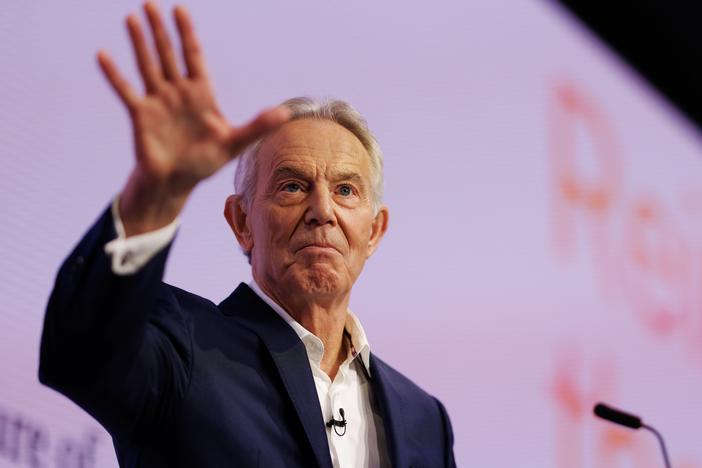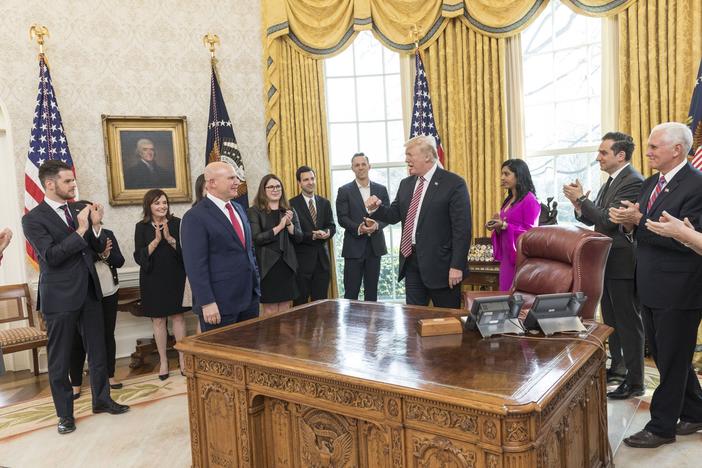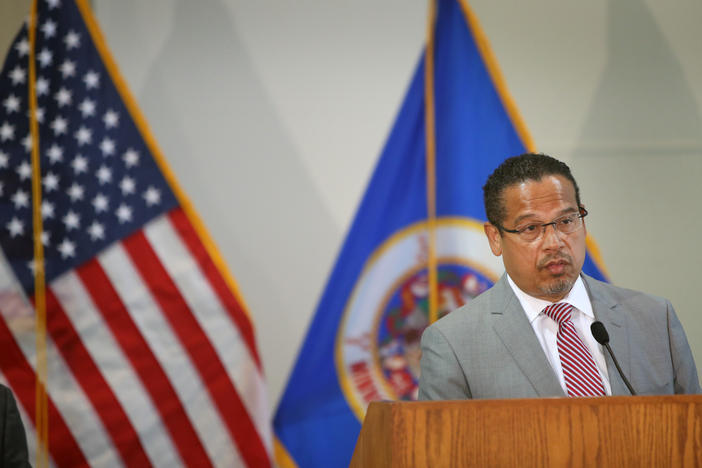Section Branding
Header Content
Once again, Trump aide paints a picture of a White House wracked by chaos, infighting
Primary Content
When she was press secretary for then-President Donald Trump, Stephanie Grisham never publicly briefed reporters from the iconic lectern in the White House briefing room. But now — many months after Trump left office — Grisham has a lot to say.
In her new book, I'll Take Your Questions Now: What I Saw at the Trump White House, the longtime Trump staffer paints a portrait of an administration wracked by chaos and infighting egged on by the president himself.
"At the White House, Trump was the distant, erratic father we all wanted to please," Grisham writes.
It is far from the first tell-all book to come out about the prior administration from an angry former aide — at this point, spurned Trump loyalists turned critics could basically have their own section in a bookstore.
Still, Grisham stands out because in a White House where turnover was constant, she managed to go from the campaign to working in the White House and remained there for almost all of Trump's presidency.
She also was one of the few who worked closely with both the president and the famously press-shy first lady, Melania Trump.
In the first few pages, Grisham sums up her tenure this way: "For nearly six years I was as close to the Trump family as anyone could be. I saw everything. I saw it all."
There's no doubt Grisham saw plenty. She dishes on Trump's talks with Russian President Vladimir Putin and other world leaders, Melania Trump's reaction (or nonreaction) to the Jan. 6 insurrection — and that infamous jacket worn by the first lady.
But for someone who worked so closely with the Trumps, Grisham's account is striking in how distant it seems to be from its subjects.
There's also very little ruminating about the enormous global consequences of a White House described by Grisham as consumed with petty grievances.
At times the book almost reads like a tale of a working-class woman grappling with over-the-top demands from a mercurial rich couple that employs her — not the story of a top government official who represented the leader of the free world.
Trump on the world stage
As press secretary, Grisham got to see how Trump behaved on the world stage.
While Grisham argues that Trump advocated for U.S. interests when talking with other leaders, she also says he would frequently get bored and make wild promises that his staff would ignore.
She also describes a 2019 meeting between Trump and Putin, writing that Trump seemed to really want to impress Putin and even told him: "Ok, I'm going to act a little tougher with you for a few minutes. But, that's just for the cameras, and after they leave we'll talk. You understand."
Grisham also speculates that Putin used an attractive woman as an interpreter to distract Trump and that Putin coughed throughout the meeting to throw Trump (who is a well-known germaphobe) off his game.
While discussing Trump's approach to foreign policy, she also recounts several instances of casual racism from Trump, although Grisham does not identify it that way. According to Grisham, Trump said of the Iranians: "They're always trouble. They're wired that way, perhaps." In another incident, Trump is talking with the prime minister of Pakistan about a potential trip to India and mentions that he is amazed that in India so many people use the bathroom in the streets.
Grisham also says that when she told Trump that she would love to be ambassador to Malawi, he responded: "I would peg you as a European girl or just somewhere more elegant."
Working with the first lady
Much of Grisham's time was spent working with Melania Trump, as her spokeswoman and, eventually, as her chief of staff.
They ultimately fell out after, Grisham says, Melania declined to immediately condemn the rioters on Jan. 6.
Throughout the book, though, Grisham still seems to have a great deal of affection for the former first lady, repeatedly referring to her in the book as "my girl." Still, it's not clear that the warm feelings were ever really reciprocated.
In the midst of the scandal about secret payments Trump made to cover up an alleged affair with an adult-film actress, Grisham asked Melania about whether she would like to go for a walk on the private beach at the Trumps' Mar-a-Lago resort. She says she made the invitation as a friend, so they could talk "woman to woman." But Melania assumed it was a press opportunity and asked whether there would be paparazzi, and the heart-to-heart walk never happened.
As for the infamous jacket that the first lady wore on Air Force One when she visited children separated from their parents at the southern border, Grisham does not offer much of an explanation.
The green jacket with the words "I really don't care, do u?" set off a firestorm of criticism. At first, Grisham put out a statement saying it was just a jacket, but then the president tweeted that it was a message for the media.
Grisham says she was distracted and did not know about the jacket until reporters started asking about it. She says the president made up the idea about it being a message because he was upset about the coverage.
But she never offers any real insight into why Melania would want to wear that jacket that day, even as Grisham repeatedly highlights how much thought and planning went into the first lady's outfits.
The jacket incident is a good example of how the Trump White House could inexplicably create shallow drama from even the weightiest of topics.
Throughout the book, it's striking how small and insular the White House seems, with officials fighting and backbiting over positions in motorcades and photo-ops and constantly attempting to shift blame.
Grisham basically acknowledges as much. "I am ashamed to say that I lost sight of what I was there to do — serve the country — more than once," she says.
By the end of Trump's term, Grisham says, she also began to realize that her place in the inner circle was tenuous, especially as she began to have disputes with Trump's son-in-law and top adviser, Jared Kushner.
"No matter how close I might feel to the Trumps, I wasn't family. And family trumped all," she writes.
Copyright 2021 NPR. To see more, visit https://www.npr.org.
Bottom Content





